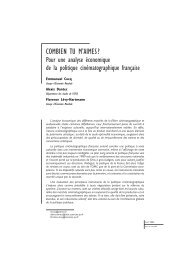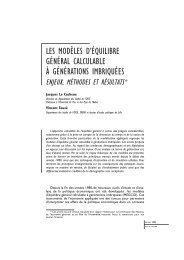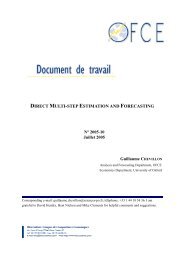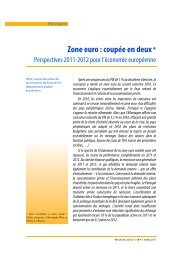N° 2005-09 Juin 2005 Guillaume Daudin* Jean-Luc Gaffard ...
N° 2005-09 Juin 2005 Guillaume Daudin* Jean-Luc Gaffard ...
N° 2005-09 Juin 2005 Guillaume Daudin* Jean-Luc Gaffard ...
Create successful ePaper yourself
Turn your PDF publications into a flip-book with our unique Google optimized e-Paper software.
Offshore Relocations and Emerging Countries’ Competition: Measuring the Effect on French EmploymentTable 1: Number of articles treating of international relocations in the French newspapersResearch terms 2000 2003 2004“Délocalisations” 215 879 4144Of which “headlines” 10 53 453“Délocalisations” + “chômage” 33 208 859“Délocalisations” + “35 heures” 20 57 500“Délocalisations” + “salaires” 30 138 7<strong>09</strong>“Délocalisations” + “chômage” + “salaires” 9 51 224“Délocalisations” + “chômage” and/or “salaires” 54 295 1344Translations: “Délocalisations” for international relocations, “Chômage” for unemployment, “35 heures” for the 35 hour working week and“salaires” for wages.Source: Lexis-Nexis.In this respect — at least up to recent months — the consequences of internationalrelocations on labour force were viewed differently in France than in the United Kingdom orthe United States. In these two latter countries, no strong labour market regulations preventthe divergence between skilled and unskilled wages 3 . Hence, international relocations areseen as exercising downward pressures on unskilled wages. In France, it is the growingunemployment of the unskilled labour force over the two last decades 4 that is perceived bymany citizens as resulting from French enterprises realising an increasing share of theiractivities in (or with) countries where labour costs are lower. However, this distinction iscurrently narrowing, as the public debate in the United States has been recently framed interms of job losses and some French cases have received a huge amount of attention in themedia and political circles about the possible adverse effects of international relocations onexisting regulations. In the case of Bosch, the public was shocked to learn that an industrialfirm was able to convince its workers of lengthening the 35-hour work week without anywage compensation, otherwise international relocation would occur. The current right-winggovernment is using the same argument to increase the support for structural reforms on thelabour market.While the debate is heated again, the underlying empirical data used by protagonists aremainly anecdotic evidence of very rough measures 5 . The goal of the present paper is to3 For a comparison between France and the U.S., see Lefranc (1997).4 The unemployment rate for males with low education (and then assumed "unskilled") rose from 5.4 % in 1981to 13.5 % in 1994. By contrast, the unemployment rate for males with high education (and then assumed"skilled") increased from 3 % in 1981 to "only" 5.9 % in 1994. The gap for female unemployment rates byeducation level is even larger: see Strauss-Kahn (2003).5 For example, Direction Générale du Trésor et de la Politique Économique (2004) simply states that 3.4 % of alljobs in 2002 (796 000) are potentially threatened by service international relocations.6








